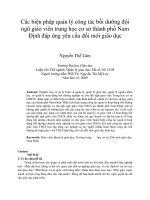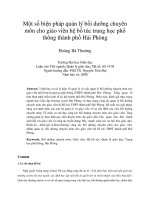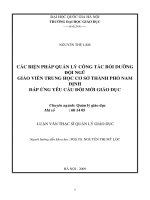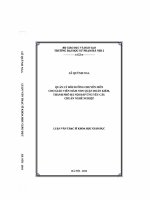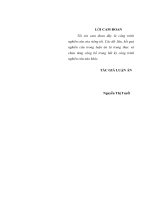Quản lý bồi dưỡng chuyên môn cho giáo viên trung học cơ sở thành phố hà nội đáp ứng yêu cầu chương trình giáo dục nhà trường tt tiếng anh
Bạn đang xem bản rút gọn của tài liệu. Xem và tải ngay bản đầy đủ của tài liệu tại đây (196.6 KB, 25 trang )
1
INTRODUCTION
1. Reasons for choosing dissertation topic
Teacher staff have a very important meaning in the cause of
Education and Training. Through professional fostering, they will be
updated with new knowledge and trends; acquiring new teaching
methods; absorb modern forms of teaching organization. On that
basis, they can foster their own expertise as active and creative
management subjects.
In the past years, professional management and training for
teachers has achieved many positive results and made positive
contributions to professional and professional activities but the quality and
efficiency are not high. . It still shows a lack of initiative, the budget is
mainly dependent on the State; contents, methods and forms of
professional training for teachers are still backward; efficiency has not
been achieved as expected, has not made professional training activities
really become self-fostering activities in the teachers.
In teaching theory and practice, the renewal of teaching
methods and assessment methods requires redesigning the school's
teaching and educational programs. At the same time, the educational
program of each school must take into account the socio-economic
conditions, the capacity of teachers, the conditions of facilities,
teaching equipment, and trend update in the region and the world. It
is called the school education program.
In Hanoi city, professional management activities for teachers also
have positive changes, contributing to improving the quality and
effectiveness of professional training and retraining management
activities.Specifically, it is the change of management form from control
to supervision; strong decentralization of management activities towards
improving and maximizing the role of school principals; improve the
effectiveness and efficiency of state management of state management
agencies in the field of education and training; adhere to the specific
requirements of the school education program. However, the quality and
efficiency of professional training for secondary school teachers to meet
the requirements of the school education program still has certain
shortcomings; not fully meet the requirements of the school education
program and the expectations of management levels as well as society.
So far, there are no authors or scientific work which has
mentioned and researched in a specific, detailed and comprehensive
way about fostering junior high school teachers to meet the
requirements of the education program at school. From the above
2
reasons, the author selected the topic: "Professional retraining
management for secondary school teachers in Hanoi City to meet the
requirements of the school education program".
2. Research purpose and tasks
* Research purpose:
The dissertation identifies professional retrain management
measures for secondary school teachers of Hanoi City to improve
the quality of the city's teachers; ensure teachers effectively
implement the school education program; contribute to
implementing the fundamental and comprehensive renovation of
education in Vietnam today.
* Research tasks
The dissertation has surveyed and evaluated the status of
professional retraining management for junior high school teachers in
Hanoi city to meet the requirements of the school education program;
Identify professional retraining management measures for secondary
school teachers in Hanoi city to meet the requirements of the school
education program; making experiment and testing proposed measures.
3. The subject, object, scope of research and scientific
hypothesis
* Research subject: Professional retraining management for
secondary school teachers.
Research object: Measures of professional retraining
management for secondary school teachers in Hanoi City to meet the
requirements of the school education program.
* Scope of research: The research project on professional
retraining for secondary school teachers meets the requirements of
the school education program based on the current education program
of the Ministry of Education and Training; Surveying the practical
situation of professional retraining management for secondary school
teachers with data from 2014 to 2017; The management subjects in
professional retraining and management for secondary school
teachers are secondary school managers.
* Scientific hypothesis
If the requirements and professional content for secondary
school teachers are determined to meet the requirements of the school
education program, at the same time, it is necessary to develop and
apply professional retraining management measures for teachers,
especially building schools according to organizational models of
learning to develop professional skills for teachers; It will improve
3
the quality and efficiency of professional retraining management for
secondary school teachers and contribute to the success of the school
education program in Hanoi city.
4. Methodology and research methods
*Methodology: The dissertation uses the following methodology:
dialectical materialistic perspective; Historical and logical views; Practical
view; System approach perspective; Perspective of capacity access;
Perspective of approaching the function.
* Research methods: The dissertation uses a combination of
theoretical, practical research methods and additional research
methods, namely: Theoretical research methods. Practical research
methods: Observation method; active product research methods;
survey and survey methods; deep interview methods; expert
consultation method; method of summarizing experience; assay
method; Test methods and complementary methods: Methods of
processing data by mathematical statistics.
5. New contributions of the dissertation
The dissertation identifies the requirements of the professional
capacity of secondary school teachers to meet the requirements of the
school education program; analyzes and assesses the situation; points
out the advantages, limitations and causes of the situation of
professional retraining management for secondary school teachers in
Hanoi city; assesses factors affecting professional retraining
management for middle school teachers; proposed 6 professional
management measures for secondary school teachers in Hanoi to
contribute to improving the quality of the secondary school teachers
to meet the requirements of the school education program.
6.Significances of the dissertation
In terms of theory: The dissertation contributes to developing
the theory of professional retraining management for teachers;
clarifying the content and requirements of professional competence,
building a process system and conditions for professional training
management for secondary school teachers in Hanoi to meet the
requirements of the education program at school.
In terms of practice: Clarifying the characteristics of
professional retraining management for teachers; analyzing and
assessing the status of professional retraining management for Hanoi
secondary school teachers to meet the requirements of the school
education program as a basis for research to find solutions improve
methods, improve the status of professional retraining management
4
for secondary school teachers in Hanoi to meet the requirements of
the school education program; propose solutions to improve the
efficiency of professional retraining management for secondary
school teachers in Hanoi to meet the requirements of the school
education program in the future.
7. Structure of the dissertation
The dissertation includes introduction, four chapters (13
periods), conclusions, list of scientific works of the author related to
the dissertation, list of references and appendices .
Chapter 1
OVERVIEW OF RESEARCH ISSUES RELATED TO
DISSERTATION
1.1. Scientific research works on professional retraining for
teachers
The author Michel Develay (1998) mentioned that the issue of
teacher training and retraining is very specific and detailed and
considers that the issue of retraining is a regular work of the school
and each teacher.
A number of studies by authors in OECD member countries have
shown the requirements of a teacher, including: rich knowledge of the
scope of the program and the scope of the subject you teach; pedagogical
skills; have reflective thinking, self-critical ability; understanding
sympathy and commitment to respect the dignity of learners ...
Jaques Nimier argues that psychological training is the duty of
all career fields; Each teacher must be trained and trained very deeply
while studying at university and when participating in teaching, they
must train their psychology themselves.
In China, the authors conceived that the training and retraining
of teachers is really the "important work" of the entire education and
training industry; is the foundation for teaching new generation,
training people with good moral.
In France, the authors and education managers believe that
teaching is a profession that requires a high professional training and
a strong emphasis on training.
Le Trung Chinh focused on researching the issue of developing
high school teachers in Da Nang city in the current context; Identify the
orientation of high school education development of Da Nang city based
on the socio-economic development orientation and current situation of
Da Nang education and training.
5
Nguyen Phuoc Bao Khoi gives an opinion on the training of
teachers as follows: Combining initial training and continuing training,
fostering both professional and professional skills; identify teacher training
at the institution through professional activities with specific orientation
and active participation of teachers of pedagogical universities that will
best overcome limitations of pure experience high school teachers as
well as pure reasoning of pedagogical teachers.
1.2. Scientific research works on professional retraining
management for teachers to meet the requirements of the school
education program
1.2.1. Scientific research works on professional retraining
management for teachers
K.B. Everard, Geoffrey Morris and Ian Wilson argue that
professional retraining management for teachers is a key issue for
effective school management.
The author Tran Mai Uoc thinks that improving the selflearning capacity of secondary school teachers will be one of the
important and necessary factors in both improving professional
qualifications, teaching and educational capacity of teachers.
Ho Canh Hanh evaluated the practical situation of training
management of secondary school teachers in the Southeast region,
proposed and experimented with 6 solutions to improve the
effectiveness of training management for the teachers to meet the
need of secondary education in the Southeast.
Nguyen Duy Hung has built a theoretical basis for research
issues. After surveying and assessing the current status of quality
management for education administrators; proposed 5 solutions to
improve the quality and effectiveness of quality management to
educate educational managers in order to meet the requirements of
current education innovation.
Nguyen Kieu Oanh deeply studied the management of
pedagogical training activities for CDIO university lecturers.
Nguyen Thi Xuan Mai said that building a school culture
according to a learning model is also one of the solutions of
professional improvement for teachers which is the solution that
principals choose to foster professionalism for teachers.
1.2.2. Scientific research works on professional retraining
management for teachers to meet the requirements of the school
education program
Tran Trong Ha has made new and significant contributions to
the theory and practice of development of the high school education
6
program, which is a diagram of development of the high school
education program.
Ngo Minh Oanh said that self-study is the way to improve and
develop the career of high school teachers.
Nguyen Thi Thuy said teacher career development is a longterm process starting from the initial preparation in vocational
training institutions and continuing until retirement; Since then
propose some solutions to improve the self-study environment of
high school teachers.
Nguyen Thi Tho and Nguyen Thi Phuong Thuy affirmed: each
teacher must achieve the standard of high school teachers with 8
criteria of teaching capacity.
Tran Thi Hai Yen has built up a theoretical framework of
management to improve teaching capacity for teachers and believes
that management of training capacity for high school teachers
according to professional standards.
Ngo Thi Phuong Thao approached the problem of professional
retraining management from the direction of solving the problems of
the professional team at school. This is because the professional
teams and their operation have a very important role to develop
teaching capacity for secondary school teachers which is the essential
content of professional retraining for secondary high school teachers.
The issues that dissertation to be solved
In Vietnam, until now, there are no scientific works and
scientific work that study a comprehensive and profound issue to the
following issues: First, objectives, content, methods and
organizational forms professional retraining for secondary school
teachers to meet the school curriculum requirements. Secondly,
measures to manage professional retraining activities for secondary
school teachers to meet the requirements of the school education
program have not been fully and comprehensively studied. Thirdly,
the issue of school education programs directed by the Ministry of
Education and Training and implementation guidance has not been
adequately studied; has not yet identified the specific requirements of
the school education program with secondary school teachers.
Conclusion of Chapter 1
Most authors determine that professional retraining for
teachers plays a very important role in implementing the education
and training tasks of the school; directly and indirectly contribute to
7
improving the quality of education of the school; especially
contributing to the success of the school education program.
However, there are still many "gaps" in the field of
professional retraining management for secondary school teachers to
meet the requirements of the school education program; these are:
Objectives, contents, methods and forms of organizing professional
fostering activities for teachers, especially secondary
school
teachers; management activities of professional training for
secondary school teachers have not been fully covered; the function
of professional retraining management for teachers to meet the school
education program requirements; management measures to improve
the quality and efficiency of professional retraining management for
teachers to meet the school education program requirements.
Chapter 2
THEORETICAL BASIS OF PROFESSIONAL
RETRAINING MANAGEMENT FOR SECONDARY SCHOOL
TEACHERS IN HANOI CITY TO MEET THE
REQUIREMENTS OF THE SCHOOL EDUCATION
PROGRAM
2.1. Professional retraining for teachers to meet the
requirements of the school education program
2.1.1. the school education program of secondary school
and professional requirements of teachers
2.1.1.1. Concept of education program, school education
program, school education program at the secondary school
Education program: Education program shows educational
goals; prescribing the standard of knowledge, skills, scope and
structure of educational content, methods and forms of organizing
educational activities, methods to assess educational outcomes for
subjects in each class, each level study or training level.
The secondary school education program: Secondary
education aims to help students strengthen and develop the results of
primary education; have high school education at the basic level and
initial technical and vocational knowledge to continue high school,
secondary school, apprenticeship or working..
Secondary school education program: the school education
program is the educational program of each school which is developed
and designed on the basis of the education program issued by the
Ministry of Education and Training after taking into account the local
8
socio-economic characteristics; requirements on comprehensive
education innovation, updating new information and trends in the region
and the world; update the achievements of the special scientific and
technological revolution on information technology; the capacity of
teachers; conditions on facilities and equipment of each school.
2.1.1.2. Characteristics of the secondary school
education program
The school education program has been adjusted the structure of
teaching content in the current program and developed a new education
plan in each subject, educational activities of schools; highly active,
creative and mobile, redesigned to suit a wide variety of students; both
focus on the general strength of the students, and highly individualized
and maximize the capacity of each student; innovating methods and forms
of educational institutions towards student capacity development.
2.1.1.3. Professional requirements for secondary school
teachers to meet the requirements of school education programs
The school education program requires secondary school
teachers to change a lot in terms of professional and operational
skills. Firstly, innovating teaching methods, organizing forms of
teaching in a positive direction; having the ability to redesign many
teaching contents and subjects in the direction of integrating general
and interdisciplinary topics. Secondly, teachers change the methods,
ways of managing and organizing students in the classroom in the
spirit of implementing the school education program. Thirdly,
teachers must change the way of checking and evaluating. Fourly, the
school program requires itself that every secondary school teacher
must constantly study and practice constantly for the objective
requirements of the school education program.
2.1.2. Professional retraining for secondary school teachers
to meet the requirements of the school education program
2.1.2.1. Concept
Profession and professional capacity: The ability to meet and
complete specific tasks in a specific science, technology or a career field.
The professional capacity of secondary school teachers is considered the
ability of teachers to meet the requirements of the task of teaching and
educating secondary school students; It is formed during the process of
studying at the university and in the process of working at the secondary
school and through the training and self-fostering process of the teacher.
Professional retraining: As an additional activity, providing and
updating basic science knowledge and skills related to the subjects in
the secondary school program to teach all grades meet the
9
requirements of student and requirement of education innovation and
integration requirements.
2.1.2.2. The elements of professional fostering for secondary
school teachers to meet the requirements of school education program
Objective: To help the school to complete the tasks and plans assigned to
each school year and develop according to the long-term strategy.
Content: Professional retraining activities for secondary school
teachers to meet the requirements of the school education program to
implement the following main contents: Compulsory knowledge
group; Knowledge of choice; Knowledge meets the requirements of
the school education program
Methods and forms of professional retraining for teachers: Including
the following specific methods: Presentation of reporters; Solve the problems;
Project method; Practice introduction; Invite expert trainers; Fostering by
subject groups at the school; self-training.
Professional retraining results for teachers: Demonstrated in
the products obtained by professional retraining after the completion
of this activity organization. The product of professional retraining is
the most realistic and objective reflection on the results of
professional retraining.
2.2. Professional retraining management for
secondary
school
teachers
meeting
the
requirements of school education program
2.2.1. Concept
2.2.1.1. Management: Management is a conscious activity of
people to orient, organize, use resources and coordinate the actions of
a group of people or a community to achieve the goals in the most
effective way in certain context and conditions.
2.2.1.2. Professional retraining management for teachers:
Professional training management is the activity of educational management
subjects to organize and coordinate support activities for teachers; help them
master and supplement basic science knowledge, skills related to the
subjects in the secondary school program to teach all grades of secondary
schools to meet the requirements of student statues, education reform
requirements and integration requirements..
2.2.1.3. Professional retraining management for teachers meeting
the requirements of the school education program: Professional retraining
management for teachers to meet the requirements of the school education
program is a combination of activities of educational subjects to help the
secondary school teachers to meet the requirements of the school education
10
program; contributing to the successful implementation of the school
education program through organizing and coordinating support activities
for teachers; let them master, supplement and update basic scientific
knowledge, practice skills related to the deployment of subjects in the
secondary school program in the direction of promoting students' abilities
and the integration of knowledge of related subjects, content innovation,
teaching methods and innovation of examination and evaluation.
2.2.2. The role of subjects in professional
retraining management for secondary school
teachers to meet the requirements of the school
education program
2.2.2.1. The rector's role in professional retraining
management for secondary school teachers
The principal is the person who determines and evaluates the exact
ethical and professional requirements that needed to retrain for secondary
school teachers to meet the requirements of the school education program.
Principals make plans to organize professional training for teachers within
the scope of management; direct, organize and test professional retraining
activities for secondary school teachers to meet the requirements of the
school education program development.
2.2.2.2. The role of the professional team leader
In the management system of secondary schools, the
professional leader is the head of a section or a subject. Therefore,
this is a person who is really knowledgeable about that area of
expertise. The professional leader is a person with professional
competence, especially the ability to serve teaching and educating
students, and has a reputation for teachers.
2.2.2.3. Role of state management agencies
In reality, the management mechanism of Education and
Training of Vietnam, the State management agencies have a huge
role, even a decisive role to manage professional retraining for
secondary school teachers. It has proved through the regular and
periodic training for secondary school teachers.
2.2.2.4. Role of secondary school teachers
Secondary school teachers are particularly important for
professional retraining; professional retraining management for
teachers; implementing school education programs; being a
proactive, active and creative subject in self-training activities for
themselves. In professional self-training, they are a direct factor to
determine the quality and efficiency of fostering.
11
2.2.3. The requirements of professional retraining
management for secondary school teachers to meet the
requirements of the school education program
Professional retraining management for teachers must be based
on the educational program issued by the Ministry of Education and
Training, based on the school's characteristics, local characteristics
and teachers in the school. Professional retraining for teachers should
be based on building teachers into a learning organization to create an
environment that motivates teachers to develop careers.
The relationship between professional retraining for teachers
and school building in the direction of "learning organisation".
The school of "learning organization" has the following
specific models and characteristics: There is a positive cultural
atmosphere; have a culture of teaching and learning towards
quality; motivating work for all members; relationships in the
school friendly; have appropriate policy mechanisms; there are
behavioral cultural norms in the school.
It can be determined: This is a two-way relationship, which
affects, interacts with each other, which is the premise for the other to
develop; In order to manage professional training for highly effective
teachers, it is imperative to build schools in the direction of "learning
organisation". When schools are built schools in the direction of
"Learning organisation" will help managers improve their professional
skills for teachers to take advantage of the highest efficiency.
2.2.3.3. Organizing professional activities is a direct factor
affecting the professional capacity of teachers to meet the
requirements of the school education program
For the organization of the implementation of the school education
program, the organization of professional activities has an important
meaning to the quality and effectiveness of program implementation. In
professional sessions, teachers need to discuss, agree and identify the
following specific contents: How to integrate and integrate the content of
the school education program? Diversify the methods and forms of
organization to implement the school education program in any direction?
How is the role of subjects in the school education program? How should
professional retraining for teachers be organized to meet the requirements
of the school education program? How do professional retraining
management for teachers need to be renewed?
2.2.3.4. Managing conditions to support self-training teachers
based on the characteristics of each teacher will help teachers
perfect their professional competencies
12
The management of supporting conditions for self-fostering
teachers must be based on the characteristics of each teacher, namely:
the capacity, forte, strengths of teachers; exist, need to be overcome
by each teacher; personality, physiology, personality of individual
teachers; family circumstances...
2.3. Affecting factors of professional retraining
management for secondary school teachers meet
the school program requirements
Professional retraining management for secondary school
teachers to meet the requirements of the school education program is
influenced by the following factors: situation of the world, country
and local context; Requirements for comprehensive education
innovation; The revolution of science and technology, especially
information technology, the industrial revolution 4.0; The
professional capacity of secondary school teachers has not fully met
the requirements of the school education program.
Conclusion of Chapter 2
In the chapter 2, the author presents the results of the study of
basic theoretical issues of professional retraining management for
secondary school teachers, including tool concepts and clarification
of professional retraining management for secondary school teachers
to meet the school requirements of school education program. In
particular, the concept of the school education program has been
inherited by the author, synthesizing previous studies.
In order to manage professional retraining for middle school
teachers to meet the requirements of the school education program,
we focus on the following research: research and build lessons that
are appropriate for the audience in the school educational program;
setting up professional retraining forms through lecturing activities
and a system of materials for teachers.
The evaluation of program development capacity through the
development of subjects and lessons with interdisciplinary;
professional activities among school groups, professional teams on
school education program development; Principals of secondary
schools and professional leaders; the management of professional
retraining activities for secondary school teachers to meet the
requirements of the school education program.
Chapter 3
13
PRACTICAL BASIS OF PROFESSIONAL RETRAINING
MANAGEMENT FOR SECONDARY SCHOOL TEACHERS
IN HANOI CITY TO MEET THE REQUIREMENTS OF THE
SCHOOL EDUCATION PROGRAM
3.1. The process of surveying the situation
The organization of status studies to accurately and objectively
assess the practical and professional management issues for
secondary school teachers. Specifically: Assessing the status of
professional training activities for secondary school teachers in Hanoi
city; assess the status of professional training management for
secondary school teachers in Hanoi city.
The project organized survey with questionnaires with 486
people, directed to the subjects who are education managers,
secondary school teachers in Hanoi city. Specifically: managers: 153
people. secondary school teachers: 333 people.
The author uses statistical probability method to process data
through table, charting, calculation of specific parameters (average
sample, average, variance, deviation standard, T-test, correlation
coefficients). The data is processed by specialized statistical software
(SPSS) and Excel software to synthesize the comments.
3.2. Overview of secondary education and secondary school
teachers in Hanoi city
3.2.1. A few features about Hanoi secondary education
Hanoi has 147 secondary schools with 100% of students having 2
sessions per day, 97 schools have some classes having 2 sessions per day.
The content of teaching 2 sessions / day focuses on tutoring weak students,
fostering good students. In 2014 and the first 6 months of 2015, the city has
recognized 38 national standard schools, bringing the total number of
standard secondary schools to 312. Schools have also actively implemented
"Connecting Schools" in organizing and managing professional activities
online, and actively building teaching topics of professional groups,
renewing professional activities. oriented to teaching and assessment to
develop student capacity.
3.2.2. Practical situation of secondary school
teachers in Hanoi
3.2.2.1. Professional qualifications of Hanoi secondary
school teachers
3.2.2.2. Foreign language proficiency of Hanoi secondary
school teachers
14
3.2.2.3. Information technology proficiency of secondary
school teachers in Hanoi
3.3. Practical situation of professional retraining for
secondary school teachers in Hanoi city
3.3.1. Practical situation of content of professional retraining
for teachers
There are 442/486 respondents (accounting for 91%)
identified: The content of professional retraining for secondary
school teachers in recent years includes 8 specific contents .
Most respondents are directly and indirectly involved in
professional retraining activities for secondary school teachers
who have agreed to determine 8 contents of the above-mentioned
professional retraining to be implemented to foster expertise for
secondary school teachers.
In the content of professional retraining, the knowledge block
to meet the requirements of the school education program is assessed
at the highest level compared to the remaining knowledge blocks.
There are 440/486 respondents (accounting for 90.5%) assessing the
knowledge block to meet the school education program is very
necessary. Only 425/486 respondents (accounting for 87.4%) rated
compulsory knowledge as very necessary and only 412/486
respondents (accounting for 84.8%) rated the elective knowledge
block as necessary.
3.3.2. Practical situation of methods and forms of
professional retraining for secondary school teachers in Hanoi city
The effectiveness of professional training methods for secondary
school teachers is assessed at other average levels (2.9 points). Comparison
between methods shows that: The method of practice guidance is the most
appreciated and the Project method is evaluated at the lowest level.
Professional training for secondary school teachers is assessed
at a fair average (average score of 2.9). Comparison between the
forms of professional training can be found that solving situations is
the most appreciated form of professional training; lowest is the form
of professional training organized towards the project.
3.3.3. Practical situation of professional fostering
effectiveness for teachers
The majority of respondents (302/486 accounting for
62.3%) rated professional retraining activities now organized
with good results. They said: Although there are still some
problems, but fairness and evaluation, the professional fostering
15
activities organized by the school and educational management
levels are quite good; It is organized relatively scientific, has a
unified plan, the method of organization is quite appropriate with
the content, location and appropriate time; being supported by a
team of junior high school teachers and deeply involved with a
high sense of responsibility.
A department assesses professional fostering activities at a quite
and average level. Specifically, the corresponding figures are 104/486
respondents accounting for 21.3% and 68/486 respondents 13.9%. A small
part (12/486 respondents accounted for 2.5%) rated very well.
3.3.4. Practical situation of subjects participate in
professional retraining for secondary school teachers
Subjects participate regularly in professional retraining for
secondary school teachers quite frequently (average score is 2.9).
This result is also consistent with the interview results. Respondents
said that such regular participation is due to the compulsory nature of
professional retraining.
3.4. Practical situation of professional retraining management
for secondary school teachers in Hanoi City to meet the requirements of
the school education program
3.4.1. General situation of professional retraining management
for Hanoi secondary school teachers
The management of professional retraining for secondary school
teachers of Hanoi city is assessed mostly at a fairly high level
(accounting for 89.3%); some respondents rated the average level
(9.2%); a small part rated good (1.3%). Particularly, 0.3% rated weak.
3.4.2. Practical situation of developing professional
retraining plan for Hanoi secondary school teachers
All of the criteria for assessing the development of professional
retraining plan are evaluated and ranked by most of the subjects.
3.4.3. Practical situation of professional retraining for
secondary school teachers in Hanoi meets the requirements of the
school education program
All criteria for assessing the organization of professional
retraining activities for secondary school teachers are mostly
evaluated fairly well. Combining all three criteria above shows that
the organization of professional training activities for secondary
school teachers is assessed at a fairly high level.
16
3.4.4. The practical situation of directing professional
retraining for secondary school teachers in Hanoi meets the
requirements of the school education program
The criteria for evaluating the direction of professional retraining
activities for secondary school teachers are assessed mostly at a fairly high
level. Comparison between possible criteria: The third criterion is close to
the fact that the criterion is rated higher than the other two criteria.
3.4.5. The practical situation of checking and
evaluating professional retraining activities for
secondary school teachers in Hanoi city
In general, the criteria for assessing the testing and assessment
of professional retraining activities for secondary school teachers are
ranked at fair level. Combining these three criteria shows that: Most
respondents rated the testing and assessment of professional
retraining activities for secondary school teachers ranked at fair level.
3.4.6. Practical situation of managing objectives, contents,
methods, methods, facilities and conditions for professional
retraining of secondary school teachers in Hanoi city
All the criteria for evaluating the management of objectives,
content, methods, methods and facilities for professional retraining
are evaluated and ranked by most of the subjects. Synthesis of 4
criteria is assessed at a good level.
3.4.7. Practical situation of factors affecting
professional retraining and management of
secondary school teachers in Hanoi city
The factors that have a significant impact on the professional
retraining management of secondary school teachers in Hanoi, this
result shows the average score of 2.90. Comparing the influencing
factors, it can be seen that the professional capacity of secondary
school teachers is the main factor that the participants think is the
most influential with a score of 2.99.
3.5. Overall assessment of the status of professional
retraining management for secondary school teachers in Hanoi
city
3.5.1. Advantages
Professional retraining for secondary school teachers receiving
the attention of the city government; the support of relevant levels,
departments and branches which creating synergistic and unified
power for Hanoi education and training branch to implement the
tasks smoothly and effectively as expected.
17
Hanoi is one of the provinces and cities with the highest
percentage of teachers meeting the standards. Hanoi's teachers are
sufficient in quantity, balanced in terms of structure and quality
assurance; high spirit and responsibility can fulfill the tasks that the
educational management levels set with the highest efficiency.
Professional retraining for secondary school teachers is one of
the strengths of the education and training branch. Specific activities,
from planning to organizing, directing and inspecting and evaluating
professional retraining activities, are carried out very scientifically,
professionally and effectively by educational management.
3.5.2. Limitations, causes
Firstly, professional retraining for secondary school teachers to meet
the requirements of the school education program is only at the level and
scope of the experimental schools; not yet implemented in a wide range.
Secondly, the merger and expansion of administrative boundaries
create a disparity with the secondary schools in the Hanoi city.
Thirdly, the existence of the model of public and non-public
secondary schools has caused many difficulties for the professional
retraining management for secondary school teachers. Funding
sources for professional retraining for teachers of non-public
secondary schools are not estimated from non-business funding;
mainly from student fees.
Conclusion of Chapter 3
Over the past years, the management of professional retraining
activities for secondary school teachers has been quite positive, initially
investigating and understanding the needs and aspirations of the secondary
school teachers. However, the management of professional retraining
activities for secondary school teachers in Hanoi city is still limited in
monitoring activities; no set of evaluation criteria with qualitative nature; the
evaluation carries many qualitative factors.
The organization of professional fostering for secondary school
teachers of non-public schools has yet to be resolved to the root of
the incident as a concrete illustration of the operation management.
Professional retraining for secondary school teachers. Thus, with the
trend of integration with education and training of the region and the
world, the management of professional retraining for secondary
school teachers also has many favorable opportunities but also poses
many challenges. Given this situation, the proposal and
implementation of professional retraining management measures for
secondary school teachers is an urgent and scientific issue of the
problem being studied in Hanoi city.
18
Chapter 4
MEASURES AND EXPERIMENT OF PROFESSIONAL
RETRAINING MANAGEMENT FOR SECONDARY SCHOOL
TEACHERS IN HANOI CITY TO MEET THE
REQUIREMENTS OF THE SCHOOL EDUCATION
PROGRAM
4.1. System of professional retraining management
measures for Hanoi secondary school teachers to meet the
requirements of the school education program
4.1.1. Determine the need for fostering on the
basis of the school education program analysis and
the professional capacity of teachers
4.1.1.1. Target
This measure aims to: to identify the specific content to conduct
professional retraining for secondary school teachers to meet the needs of
professional secondary teachers themselves and ensure the items
professional retraining of other management subjects on the basis of
analyzing the requirements of the school education program and surveying,
assessing the professional capacity of secondary school teachers.
4.1.1.2. Content and methods
In order to implement this measure, it is necessary to
implement the following contents and methods: Accurately and
specifically analyzing the school education program; Surveying and
evaluating the professional capacity of secondary school teachers;
Identify the needs of professional retraining secondary school
teachers to meet the requirements of the school education program;
Summarize, analyze and classify the need for professional retraining
of secondary school teachers.
4.1.1.3. Conditions of implementation
Firstly, the management subjects must have a deep
understanding of secondary education, the special characteristics of
the whole level as well as the characteristics of each class. Secondly,
there are methods, ways to determine the needs and aspirations of
fostering the professional skills of secondary school teachers
correctly and reasonably in the spirit of respecting and meeting the
needs of fostering professional skills.
4.1.2. Establishing criteria to assess professional capacity to
foster secondary school teachers to meet the requirements of the
school education program
19
4.1.2.1. Target
This measure aims to build a system of criteria for evaluating
and pointing out the organizational process of assessing the
professional competence of secondary school teachers according to
the requirements of the school education program.
4.1.2.2. Content and methods
This measure includes the following contents and methods:
Firstly, establishing and developing a system of criteria to assess the
professional competence of secondary school teachers. Secondly,
determining the relationship of the criteria together; Thirdly, building a
process of assessing professional competence for secondary school
teachers according to the requirements of the school education program.
4.2.2.3. Conditions of implementation
Firstly, developing a comprehensive set of criteria, accurately
reflecting the requirements of the school education program for
secondary school teachers. Secondly, developing a process of
organizing professional assessment according to the principle of
respecting the teachers' self-assessment results and combining
internal assessment with external assessment. Thirdly, complying
with the general regulations on assessment, which are honest,
objective, accurate, in the progress, development, respect for the
personality of the person assessed.
4.1.3. Directing the implementation of professional activities
in accordance with the characteristics of the subject to enhance
professional skills for teachers
4.1.3.1. Target
This measure aims to help secondary school teachers to
implement professional activities effectively on the basis of the
characteristics of the subject.
4.1.3.2. Content and methods
Firstly, the organization for teachers to study lessons in
accordance with the school education program. Secondly, organizing
class observation. Thirdly, the organization for teachers to participate
in semina classes and subject activities.
4.1.3.3. Conditions of implementation
Firstly, classifying lessons according to the design model of
the school education program. Secondly, analyze the lesson carefully;
comparing similarities and differences with traditional lessons;
Thirdly, the role of principals and professional leaders must be
20
promoted strongly and directly; Fourthly, organizing the review,
evaluation and self-assessment activities after being scheduled, class
observation must be objective, accurate, and motivating and
encouraging.
4.1.4. Building the school in the spirit of the learning
organization to develop professional skills for teachers
4.1.4.1. Target:
This measure aims to educate the right awareness and attitude
about spirit and responsibility; role and meaning of learning
activities; the sense of working together in learning and life for all
members of the school in order to build a friendly psychological
atmosphere; strive and emulate learning, creativity and self-training.
4.1.4.2. Content and methods.
This measure includes the following specific contents and
methods: Firstly, the content and measures for teachers. Secondly, the
content and measures for students and other members of the school.
4.1.4.3. Conditions of implementation
Firstly, the principal must be an exemplary example of the
sense of self-study and self-training; willing to cooperate and
share knowledge and experiences with teachers and other
members of the school.
Secondly, to build a school to become a solidarity and
consensus in high awareness and action; The relationships within it
must demonstrate and ensure the principles defined in the regulation
and organization of the school.
4.1.5. Establish a favorable environment for teachers to
foster their professional skills to meet the requirements of the
school education program
4.1.5.1. Target
This measure aims to achieve the goal of building and
preparing all the most favorable conditions for self-training of
secondary school teachers to meet the requirements of the school
education program; including: conditions for human resources,
material resources; policy mechanisms; Psychological environment
and other conditions.
4.1.5.2. Content and methods
Firstly, education and equipping with knowledge and skills
on professional self-fostering, self-study, self-training for
21
teachers; Secondly, building a library system and resources to best
serve teachers' self-fostering activities; Thirdly, motivate teachers
to actively participate in self-fostering activities; Fourthly,
surveying the self-fostering needs of secondary school teachers;
Fifthly, determine the specific requirements of the school
education program for secondary teachers; Sixthly, linking
professional self-fostering activities with other professional
activities in the school; Seventhly, organizing the process of
evaluating self-improvement results in a scientific, accurate,
objective, public and transparent manner.
4.1.5.3. Conditions of implementation:
Firstly, the secondary school teachers themselves need to
have the right awareness and attitude about professional selffostering; the requirements of the school education program; the
need for innovation. Secondly, the secondary school principal is
really a shining example of self-improvement; leading and
orienting professional teams and each participating teacher to
foster their professional skills. Thirdly, secondary schools need to
prepare the best and most favorable conditions for technical and
material facilities for teachers to foster the most effective
professional skills.
4.1.6. Exploiting resources and facilities for professional
retraining activities for secondary school teachers to meet the
requirements of the school education program
4.1.6.1. Target
This measure aims to manage the preparation, mobilization
and coordination of all allowable resources for professional retraining
management; storing, maintaining and maximizing the function of
resources; contribute to improving the quality and efficiency of
professional retraining activities and professional retraining
management.
4.1.6.2. Content and methods
Firstly, the principal and management subjects must clearly
define the conditions to ensure professional fostering and
professional fostering management. Secondly, deploying activities of
procurement and maintenance of facilities in the whole process
(before, during and after) organizing professional training and
professional management. Thirdly, coordinate and rationally adjust
22
resources of key nature; avoid spreading; maximizing the use of
resources. Fourthly, organizing and checking the effectiveness of
using resources, timely adjusting and supplementing other resources
for professional training and professional management. Fifthly,
mobilize additional resources from outside in a socialized way to
enrich resources.
4.1.6.3. Conditions of implementation
Firstly, each teacher himself must be aware of and have a
clear and correct motive for the role, meaning and way of
exploiting resources and facilities. Secondly, each state
management agency should have proper and sufficient awareness
about their responsibility in exploiting resources and facilities.
Thirdly, elaborate specific and detailed plans on the exploitation
of resources and facilities associated with the management,
maintenance and repair; avoid waste, overlap, costly and fully
active in exploitation and use.
4.2. Testing professional retraining management measures
for Hanoi secondary school teachers to meet the requirements of
the school education program
4.2.1. Test of urgency and feasibility
Results of testing the urgency and feasibility of proposed
measures through the formula:
R=1–
R=1–
R = 0,77
Based on the results R = 0.77, it can be concluded: Between
the urgency and feasibility of the measures, there is a positive and
very close correlation. That is, both urgent measures and very high
levels of feasibility.
4.2.2. Experimenting the direction of implementing
professional activities in accordance with the characteristics of the
subject to professional foster for teachers
Learning results of students before and after the experiment: After
the experiment, the results of academic performance and behavior of
students before and after the experiment have changed markedly; That is:
23
After the experiment, the rankings of Good and Rather good are increased,
while the results rank the average and weak.
Development of teachers' professional competencies: The
development of teachers' professional competencies is demonstrated
through all 6 evaluation criteria. In each criterion, after the
experiment, the number of teachers rated at a good level increased
and the number of teachers rated at Not good level decreased.
The development of teachers' awareness of professional
fostering activities to meet the requirements of the school education
program: Teachers' awareness of professional retraining activities
meets the requirements of the school education program. There has
been remarkable progress under the influence of experiment; The
number of teachers rated at a good level has increased and the
number of teachers assessed at not good level has decreased.
The development of students' activeness, initiative, creativity
and excitement: The activeness, activeness, creativity and excitement
of students have made remarkable progress under the impact of
experiment; The number of students assessed at good levels increased
and the number of students assessed as not good decreased.
Results of experimental and control classes: The average score
of the control class is 3.50. The average grade of the test grade is:
3.53. Comparison of the input results of the two experimental classes
and the control showed that the two starting points had similar
results, the difference was negligible (respectively 3.53 and 3.50).
Conclusion of Chapter 4
In Chapter 4, the author has proposed 6 measures to improve
the quality and efficiency of professional retraining for secondary
school teachers to meet the requirements of the school education
program, including: Determining the need for fostering on the basis
of school program analysis and the professional capacity of
teachers; Establishing criteria to assess professional competence;
Directing the implementation of professional activities in
accordance with the characteristics of the subject; Building the
school collective in the spirit of learning organization to develop
professional skills for teachers; Establish a favorable environment
for teachers; Exploiting resources and facilities for retraining
activities for middle school teachers.
24
The results of scientific empirical analysis are combined with
qualitative and quantitative analysis and show: The proposed
measures are feasible and effective in the basic secondary education
practice of Hanoi City.
CONCLUSIONS AND RECOMMENDATIONS
1. Conclusion
Professional fostering activities for teachers in general and
secondary school teachers in particular have a particularly important
meaning in implementing the task of improving the quality of
education of schools. Professional retraining activities for teachers
actively and timely supplement new knowledge and skills necessary
for teaching and education activities. At the same time, this activity
also solves limitations, exists in the quality and capacity of teachers
in the implementation of teaching, education and management tasks
in the new situation.
The implementation of the school education program is
considered a new and indispensable trend of the teaching and
education process. With this trend, teaching and education activities
focus on developing the necessary competencies for students on the
basis of integrating and integrating some teaching content with close
scientific knowledge, related to each other. Since then, the
innovation, selection and use of teaching methods and organizational
forms of teaching have been seen as an indispensable requirement of
modern teaching theory as well as practical teaching at secondary
schools today and in the future.
In the past years, the education and training branch of the
whole country in general and Hanoi capital in particular have focused on
professional retraining for secondary school teachers in the form of
regular professional retraining combined with some other forms.
Through this work, secondary school teachers have gradually met the
requirements and tasks according to the school years; contribute to
improving the quality of teaching and caring and educating students.
However, this work also has some problems that need to be overcome.
After investigation, research and assessment of the status of
professional retraining for secondary school teachers in Hanoi city,
combined with the study of modern teaching theory as well as
specialties other science, the author has proposed 6 measures to
25
improve the quality and effectiveness of this work. The author has
experimented with quite satisfactory results. Through experiments, it
is possible to determine the feasible and effective measures proposed
on the participants.
2. Recommendations
For the Ministry of Education and Training and state
management agencies for education and training.
For principals of secondary school schools.
For secondary school teachers.
For non-public secondary schools.

